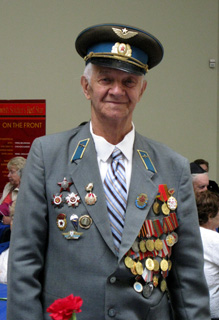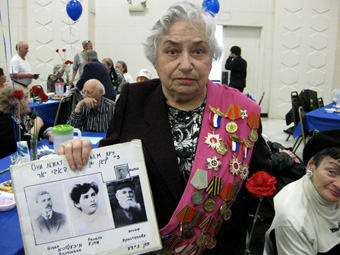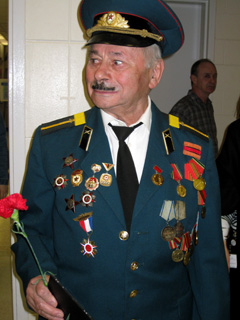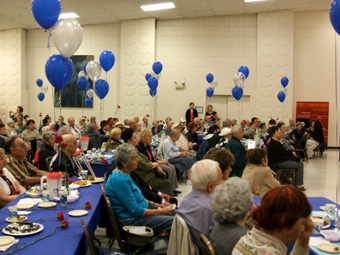Memorializing sacrifice
Permanent link

Photo credit: Susan Wexler, HIAS
Every May 9, my grandfather would put on his parade uniform from his WWII army days, pin his many medals onto the front of his jacket and take my sister and me to a gathering of his regiment. Every year, there would be fewer and fewer of the men and women with whom he risked his life in the fight against the Nazis.
My grandfather was among them. He had been a student and did not have to go fight but volunteered for an infantry unit shortly after June 22, 1941, when Germany invaded the Soviet Union. He was a participant in the critical defense of Moscow in the winter of 1942, when the war seemed all but lost and German forces were mere kilometers away from the city. Injured in 1943, he limped for the rest of his life.
Since 1945, May 9 has been celebrated as Victory Day in the countries of the former Soviet Union. It’s a solemn yet festive occasion that commemorates the struggles and the sacrifices of the wartime and celebrates the lives of those who fought and came back.

Photo credit: Susan Wexler, HIAS
As a child, I would look in wonder at the city – all dressed up in colorful flags and lights, with posters and slogans hanging everywhere. It seemed as if the entire population of Moscow was out on the street, presenting flowers to the veterans and waiting for the parade and the fireworks that ended the day. The day’s lasting impact on me is evident: The older ladies and gentlemen in military uniforms and with a multitude of medals on their chests still embody the word “veteran” for me.
During the Soviet era, the ruling Party used the holiday as a showcase for Soviet military might. But as children, my peers and I were oblivious to the larger geopolitical meaning of the day. We would revel in the chance to see smartly dressed soldiers marching in step, followed by row after row of tanks and other armored vehicles, with planes flying in formation overhead. Leaders of the hopeful democratic Russia did away with the parade tradition after the collapse of the Soviet Union, but Vladimir Putin’s administration brought it back in the early 2000s. Since then, the parade has once again become the show-stopping centerpiece of Victory Day celebrations. This year, Israeli President Shimon Peres and German Chancellor Angela Merkel attended the 65th anniversary commemoration, while Polish, Egyptian, Turkish, French, and British troops took part in the parade.

Photo credit: Susan Wexler, HIAS
But as I got older, I have come to realize the deeper meaning of the holiday.
In a country where only one in four men returned from the war without being physically harmed – no one collected stats on PTSD and other emotional illness at the time – May 9 remains one of the ways to recognize the historical significance of the fight and the importance of memory.
The Great Patriotic War, as it is known to all Russian-speakers, has left us a rich heritage of countless stories of heroism. The ruling Party used these stories to promote its agenda and to set an impossible standard to follow. The sacrifices endured by the people were only possible because they believed that they were fighting the ultimate battle, a life-or-death struggle.
Last week, ahead of the official commemoration, Chicago-area Russian veterans honored the anniversary in a series of local programs. More than 400 veterans and members of their families listened to dramatic poetry readings, sang songs and told stories at programs put together by Jewish Child & Family Services, HIAS Chicago, CJE SeniorLife and Dina and Eli Field EZRA Multi-Service Center.

Photo credit: Susan Wexler, HIAS
Every year, fewer and fewer veterans come to these events. Every year, they look around the room and sadly remark on the passing of a peer.
My grandfather died 14 years ago. He had the chance to tell his story – in fact, together with his fellow infantrymen and women, he wrote a short book (in Russian) about his experiences.
But some of the WWII veterans living in Chicago didn’t have that chance. Still, it’s not too late yet. If your grandparents were part of the war effort – whether in Europe, the United States or elsewhere, ask them about it. Let them tell you the story, so that the memory of their valiant actions lives on.



.jpg)



